If you are curious about how it is possible for vegans to eat healthy on a budget, you are in the right place to find out! Via a poll on my Instagram stories, I asked 85 budget-conscious healthy vegan eaters how they manage to eat healthy on a strict food budget. The results will give you insight into the ins and outs of eating healthy vegan on a budget!
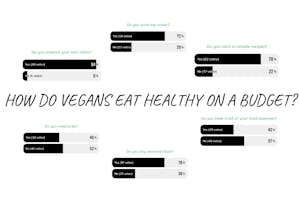
The top 11 habits vegans practice to eat healthy on a budget are:
- preparing their own meals,
- buying frozen food,
- sticking to simple recipes,
- drinking tap water,
- not buying organic food,
- buying seasonal food,
- buying food in bulk,
- meal prepping,
- tracking their food expenses,
- meal planning,
- and growing their own food.
Aside from the 11 top habits budget-conscious healthy vegans practice, there are a few more pro tips to consider at the end of this post!
This post is all about How Vegans Eat Healthy On A Budget!
How To Eat Healthy And Vegan On A Budget?
Sometimes the best way to learn how to practice new habits is by learning from others, who are already practicing the habits you want to adopt. I’m on a mission to find out exactly how vegans eat healthy on a budget, so I figured… why not ask them?
I jumped on my Instagram stories and asked 85 healthy vegan eaters about their habits. I summarised those into the top 11 habits vegans practice to eat healthy on a budget! Give them a try!
1. Prepare Your Own Meals
This may seem obvious, but if you are on a strict food budget and want to eat healthily, preparing your own meals is non-negotiable.
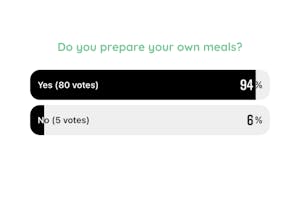
94% of budget-conscious healthy vegan eaters prepare their own meals!
When you eat out or buy ready-made meals, you pay a significant mark-up for the service of having the food prepared for you. Enjoying this service should be an occasional treat if you are on a strict budget.
2. Buy Frozen Food
Frozen fruits and vegetables are very budget-friendly. Not only do they contribute to less produce waste, but they are also often more affordable than their fresh counterparts too!
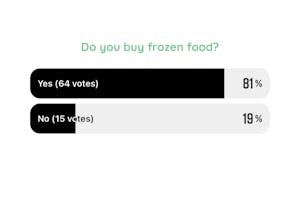
81% of budget-conscious healthy vegan eaters buy frozen food!
More benefits of frozen food include their convenience and the fact that they are just as nutritious compared to fresh foods.
3. Stick To Simple Recipes
Recipes don’t need to be complicated to be able to create delicious meals.
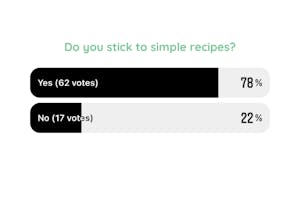
78% of budget-conscious healthy vegan eaters stick to simple recipes!
The most budget-friendly vegan meal formula is a combination of starch, legumes, and vegetables. For example, the VMPS Lentil Shepherd’s Pie, Vegan Teriyaki Eggplant Bowl, and High Protein Vegan Burrito Bowl.
4. Drink Tap Water
If the tap water in your area is safe to drink, you should definitely choose to drink it as opposed to buying bottled water, when you are on a strict budget.

72% of budget-conscious healthy vegan eaters drink tap water!
If you don’t like the flavor or are concerned about the quality of tap water, you can use a water filter. There are even kitchen gadgets that will help you turn plain water into flavoured sparkling water. Filtering and flavoring water at home is still cheaper compared to buying bottled water.
5. Don’t Buy Organic Food
Don’t allow the expensive price of organic foods to be a blocker to eating more healthily! Organic foods are not healthier, per se, in terms of nutrients.
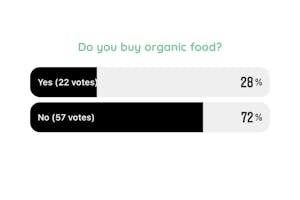
72% of budget-conscious healthy vegan eaters don’t buy organic food!
Organic foods definitely have their benefits, but if you are on a strict food budget, you should opt for conventional food. You are still getting the same nutritional benefits in conventionally grown foods as you are in organic foods.
6. Buy Seasonal Food
Naturally, seasonal food aka food that is purchased and consumed around the time that it is harvested, is cheaper!

70% of budget-conscious healthy vegan eaters buy seasonal food!
If you are based in the US, find what’s in season near you here. Check out this article, if you are based in South Africa!
7. Buy Food In Bulk
Buying food in bulk tends to be better value for money compared to buying food in smaller quantities.
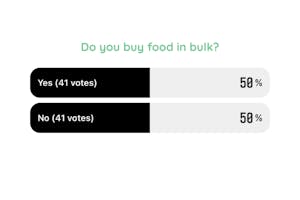
50% of budget-conscious healthy vegan eaters buy food in bulk!
The best bulk deals are to be found at bulk food stores where you can stock up on pantry items such as grains, nuts, seeds, dried fruits, flours, herbs and spices, and more!
9. Meal Prep
Whether you meal prep your meals for the week on a weekly basis, or you freeze leftovers, meal prep will help you not impulsively order takeaways or buy ready-made meals!

48% of budget-conscious healthy vegan eaters meal prep!
Considering that preparing your own meals is significantly cheaper than eating out or buying ready-made meals, meal prep can help you stick to your food budget.
8. Track Your Food Expenses
Once you set a certain budget for a specific expense category, it helps to keep track of those expenses to make sure you are sticking to your set budget.
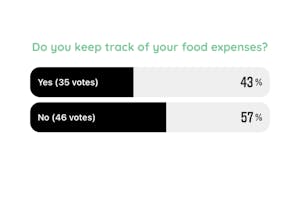
43% of budget-conscious healthy vegan eaters track their food expenses!
Nowadays there are plenty of apps that will make tracking your expenses easy.
10. Meal Plan
Making a meal plan can help you to have a good idea of the amount of food you need for the week. This will help you to only buy the groceries you will need for the week and thus not waste any groceries.

41% of budget-conscious healthy vegan eaters meal plan!
When you shop for the ingredients for your meal plan, make sure to stick to your grocery list. Don’t splurge on everything that catches your eye!
11. Grow Your Own Food
This might seem a little bit daunting, but it is another effective strategy to reduce your food expenses. Not to mention, there’s no fresher way to eat than straight from your garden.

18% of budget-conscious healthy vegan eaters grow their own food!
If you don’t have a garden to grow your own food in, you could consider indoor vertical gardens or herb pots.
12. Other Pro Tips
- Avoid processed foods and focus on whole foods,
- Shop produce at farmer’s markets or street vendors,
- Check out obsolete stock supermarkets that sell other supermarkets’ surplus of nonperishable products!
Did you find this post helpful? Don’t forget to let me know, by leaving a comment below.
This post was all about How Vegans Eat Healthy On A Budget!

